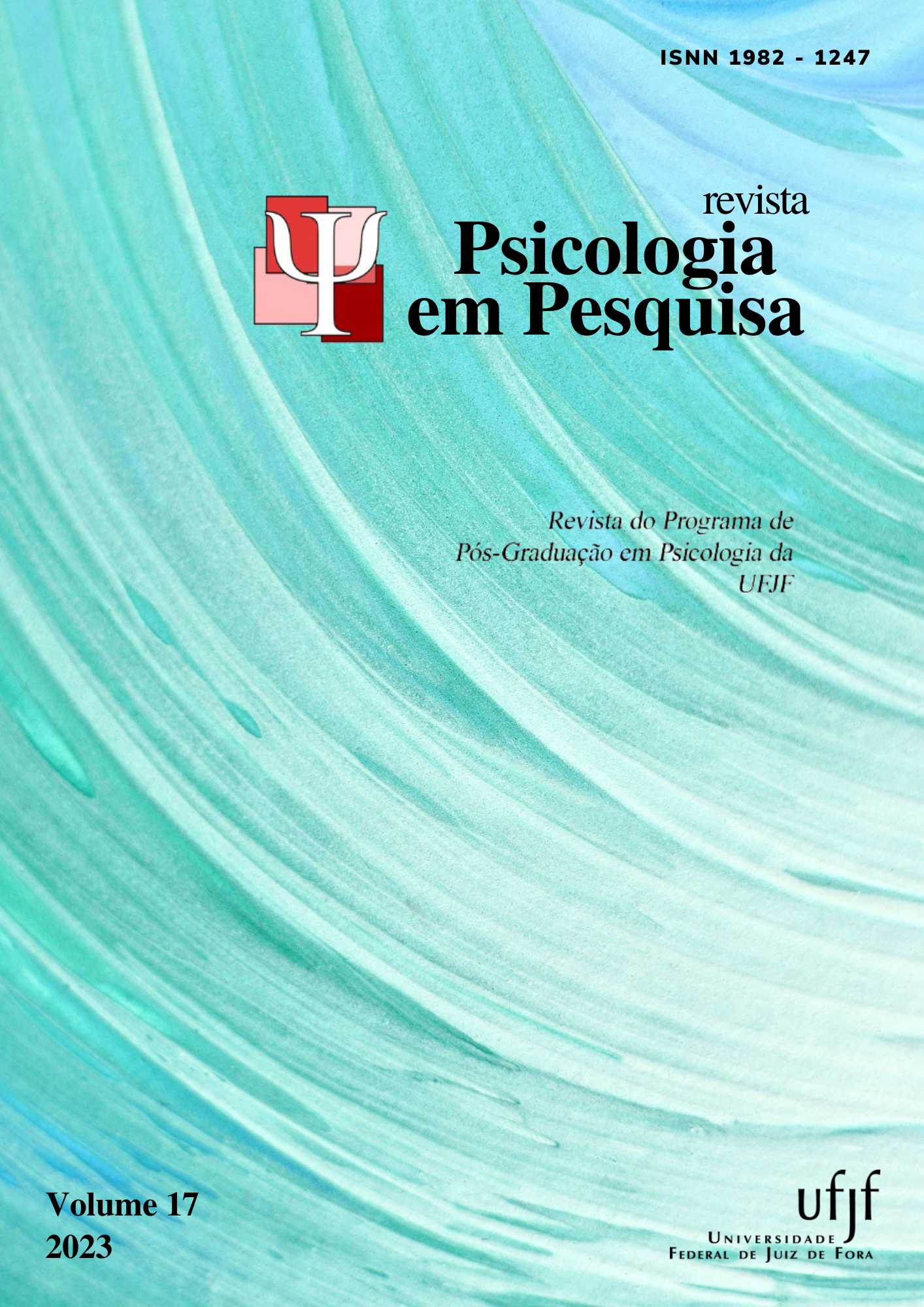Culture of honor scale:
cross-cultural adaptation to the brazilian context
DOI:
https://doi.org/10.34019/1982-1247.2023.v17.37329Keywords:
Culture; Honor; Adaptation; Scale.Abstract
Although there are studies in the national context that use a Culture of Honor Scale by Lopes-Zafra 2007, none have experienced a cross-cultural adaptation of this instrument. This article seeks to corroborate this gap within the scope of national research. It had a sample of 229 participants from the general population, with a mean age of 24.8 years (range 18 to 44 years, SD = 5.36), the majority being female (59.4%). Exploratory factorials and internal consistency analyzes were performed. These consultations corroborated with three factors, and presented adequate internal consistency, ranging from 0.62 to 0.70.
Downloads
References
Alves, K. K. S. (2022). A tese da legítima defesa da honra e a naturalização da violência contra a mulher. [Trabalho de Conclusão de Curso]. Universidade Federal da Paraíba.
Asparouhov, T., & Muthén, B. (2010). Weighted least squares estimation with missing data [Technical Appendices]. Mplus. https://citeseerx.ist.psu.edu/viewdoc/download?doi=10.1.1.310.692&rep=rep1&type=pdf
BBC News Brasil. (2020). Assassinato de menina de 14 anos pelo próprio pai em “crime de honra” choca Irã. Recuperado em 22 de dezembro de 2021, de: https://www.bbc.com/portuguese/internacional-52847568
Brown, T. A. (2006). Confirmatory factor analysis for applied research. The Guilford Press.
Canto, J. M., Alvaro, J. L., Pereira, M. E., Torres, A. R., & Pereira, C. R. (2012). Jealousy and infidelity: The role of gender identity and culture of honour. Estudios de Psicología, 33(3), 337–346. https://doi.org/10.1174/021093912803758129
Canto, J. M., Alvaro, J. L., Pereira, C., Garrido, A., Torres, A. R., & Pereira, M. E. (2017). Jealousy, gender, and culture of honor: A study in Portugal and Brazil. Journal of Psychology: Interdisciplinary and Applied, 151(6), 580–596. https://doi.org/10.1080/00223980.2017.1372344
Cavalcanti, J., Pimentel, C. E., Nascimento, T., & Moura, G. (2019). Cinco grandes fatores de personalidade como preditores das atitudes frente à pena de morte. Revista Ciência & Política, 5(2), 104–120. https://revista.iscp.edu.br/index.php/rcp/article/view/121
Cervo, A. L., & Bueno, C. (2015). História da política exterior do Brasil. Editora UnB. https://doi.org/10.2307/2518009
Damásio, B. F., & Borsa, J. (2017). Manual de desenvolvimento de instrumentos psicológicos. Vetor.
Decreto de Lei nº 2.848 de 7 de dezembro de 1940. (1940). Capítulo V, dos crimes contra a honra. Recuperado em 11 de fevereiro de 2022, de: https://www.cosif.com.br/publica.asp?arquivo=declei2848-1940p2t01c5
Ferrando, P. J., & Lorenzo-Seva, U. (2018). Assessing the quality and appropriateness of factor solutions and factor score estimates in exploratory item factor analysis. Educational and Psychological Measurement, 78, 762-780. https://doi.org/10.1177/0013164417719308
Fischer, A. H., Manstead, A. S. R., & Rodriguez-Mosquera, P. M. (1999). The role of honour-related vs. individualistic values in conceptualising pride, shame, and anger: Spanish and Dutch cultural prototypes. Cognition and Emotion, 13(2), 149-179. https://doi.org/10.1080/026999399379311
Fiske, A., & Rai, T. S. (2014). Virtuous violence. Cambridge University Press.
Galvão, L. K., & Camino, C. (2011). Julgamento moral sobre pena de morte e redução da maioridade penal. Psicologia e Sociedade, 23(2), 228–236. https://doi.org/10.1590/S0102-71822011000200003
Gouveia, V. V., Guerra, V. M., Araújo, R. de C. R., Galvão, L. K. S., & da Silva, S. S. (2013). Preocupação com a honra no Nordeste brasileiro: Correlatos demográficos. Psicologia & Sociedade, 25, 581–591. https://doi.org/10.1590/S0102-71822013000300012
Guedes, S., & Silva, E. M. (2019). O segundo sequestro do verde e amarelo: Futebol, política e símbolos nacionais. Cuadernos de Aletheia, 3, 73–89. https://memoria.fahce.unlp.edu.ar/art_revistas/pr.9691/pr.9691.pdf
IBM Corp. (2012). IBM SPSS Statistics for windows (Version 21.0). [Software de Computador]. IBM Corp.
Laros, J. A. (2012). O uso da análise fatorial: Algumas diretrizes para pesquisadores. In L. Pasquali (Ed.), Análise fatorial para pesquisadores (p. 141–160). LabPAM Saber e Tecnologia.
Lorenzo-Seva, U., & Ferrando, P. J. (2019). Robust Promin: A method for diagonally weighted factor rotation. Technical report, URV. Tarragona.
Lorenzo-Seva, U., & Ferrando, P. J. (2021). Not Positive Definite Correlation Matrices in Exploratory Item Factor Analysis: Causes, Consequences and a Proposed Solution. Structural Equation Modeling: A Multidisciplinary Journal, 28(1), 138–147. https://doi.org/10.1080/10705511.2020.1735393
Lopez-Zafra, E. (2007) Creating a scale to measure Culture of Honor. International Journal of Social Psychology, 22(1), 31-42. https://doi.org/10.1174/021347407779697520
Mesquita, A. (2014). Honra e vergonha em Aristóteles. Ensaios Filosóficos, 10, 8-25. http://www.ensaiosfilosoficos.com.br/Artigos/Artigo10/MESQUITA_A_P_Honra_e_vergonha_em_Aristoteles.pdf
Michels, R. S. (2017). O discurso conservador brasileiro nas novas mídias digitas e a honra da família: uma leitura à luz de Wilhelm Reich. Trabalho apresentado no VI Jornada de Pesquisa em Psicologia - PSI UNISC: Pesquisa e Tecnologia na Psicologia. https://online.unisc.br/acadnet/anais/index.php/jornada_psicologia/article/view/17613
Pérez, J. A., & Molpeceres, M. A. (2018). The new moral power of minorities. International Review of Social Psychology, 31(1), 1–10. https://doi.org/10.5334/irsp.18
Rodriguez-Mosquera, P., Manstead, A., & Fischer, A. (2002). The role of honour concerns in emotional reactions to offences. Cognition and Emotion, 16, 143-163. https://doi.org/10.1080/02699930143000167
Rodriguez-Mosquera, P. M., Fischer, A. H., Manstead, A. S. R., & Zaalberg, R. (2008). Attack, disapproval, or withdrawal? The role of honour in anger and shame responses to being insulted. Cognition and Emotion, 22(8), 1471–1498. https://doi.org/10.1080/02699930701822272
Saucier, D. A., Stanford, A. J., Miller, S. S., Martens, A. L., Miller, S. S., Jones, T. L., McManus, J. L., & Burns, M. D. (2016). Masculine honor beliefs: Measurement and correlates. Personality and Individual Differences, 94, 7-15. https://doi.org/10.1016/j.paid.2015.12.049
Silveira, A. C. (2021). A vida da mulher pelo direito penal: Da “legítima defesa da honra” à previsão legal do feminicídio. Revista Da Defensoria Pública RS, 1(28), 239–261. https://revistadpers.emnuvens.com.br/defensoria/article/view/366/301
Simms, L. J., Zelazny, K., Williams, T. F., & Bernstein, L. (2019). Does the number of response options matter? Psychometric perspectives using personality questionnaire data. Psychological Assessment. 31(4), 557-566. http://dx.doi.org/10.1037/pas0000648
Supremo Tribunal Federal. (2021). ADPF 779 MC-REF / DF, 2021. Recuperado em 02 de fevereiro de 2022, de: https://stf.jusbrasil.com.br/jurisprudencia/1211707732/referendo-na-medida-cautelar-na-arguicao-de-descumprimento-de-preceito-fundamental-adpf-779-df-0112261-1820201000000/inteiro-teor-1211707763
Timmerman, M. E., & Lorenzo-Seva, U. (2011). Dimensionality assessment of ordered polytomous items with parallel analysis. Psychological Methods, 16, 209-220. https://doi.org/10.1037/a0023353
Triandis, H. C. (1995). Individualism & collectivism. Westview Press.
Vandello, J. A., & Cohen, D. (2003). Male honor and female fidelity: Implicit cultural scripts that perpetuate domestic violence. Journal of Personality and Social Psychology, 84(5), 997-1010. https://doi.org/10.1037/0022-3514.84.5.997
Vandello, J. A., & Cohen, D. (2008). Culture, gender, and men’s intimate partner violence. Social and Personality Psychology Compass, 2(2), 652–667. https://doi.org/10.1111/j.1751-9004.2008.00080.x
World Values Survey. (2021). World Values Survey: Online analysis. Recuperado em 15 de dezembro de 2021, de: https://www.worldvaluessurvey.org/WVSOnline.jsp















